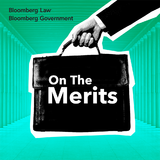Kirkland Partner Tapped for Supreme Court Debut in Criminal Case
The US Supreme Court appointed Kirkland & Ellis partner Kasdin Mitchell to argue a technical criminal matter, after the federal government said it agreed with the defendant’s argument.

Some top US law schools have dropped mentions of diversity from their websites as academic centers face a compliance deadline to ensure continued federal funding.
Weil Gotshal & Manges said Mike Aiello will chair a newly-created leadership committee as executive partner Barry Wolf prepares to retire at the end of 2027.
The US Supreme Court appointed Kirkland & Ellis partner Kasdin Mitchell to argue a technical criminal matter, after the federal government said it agreed with the defendant’s argument.

On this episode of On The Merits, Bloomberg Law’s Roy Strom spoke with two partners from Sidley Austin entertainment, sports and media practice who have a long track record of dealmaking in the major sports leagues: Irwin Raij and Eric Geffner.



The US Supreme Court appointed Kirkland & Ellis partner Kasdin Mitchell to argue a technical criminal matter, after the federal government said it agreed with the defendant’s argument.
A trial between the Justice Department and
California bar takers say the promise of a refund for some applicants isn’t enough to fix the harm caused by the chaotic lead-up to the brand new exam, pleading with State Bar trustees in a Thursday meeting to “make it right.”
Weil Gotshal & Manges said Mike Aiello will chair a newly-created leadership committee as executive partner Barry Wolf prepares to retire at the end of 2027.
Some top US law schools have dropped mentions of diversity from their websites as academic centers face a compliance deadline to ensure continued federal funding.

Kirkland & Ellis retained its crown as Big Law’s top mergers and acquisitions adviser in 2024, nabbing several of the largest transactions of the year.
Kirkland & Ellis retained its crown as Big Law’s top mergers and acquisitions adviser in 2024, nabbing several of the largest transactions of the year.




Mass tort litigation is thriving, fueled by aggressive digital advertising and litigation finance. These high-stakes cases promise huge paydays for lawyers and funders, transforming mass torts into a lucrative industry.




House Financial Services Committee Chair
Senator
The
Some top US law schools have dropped mentions of diversity from their websites as academic centers face a compliance deadline to ensure continued federal funding.
The SEC’s nascent crypto agenda under President Donald Trump has prompted the agency to slam the brakes on pending litigation involving digital asset exchanges, with agency lawyers filing bids to delay or toss proceedings in at least four cases this month.
A White House declaration that Elon Musk is operating as a mere adviser as he pushes a relentless campaign to slash government spending is setting up a constitutional clash over the billionaire Trump ally’s role in government.
Get the latest legal, regulatory, and enforcement news and analysis, as well as in-depth business and industry covering in the following areas: